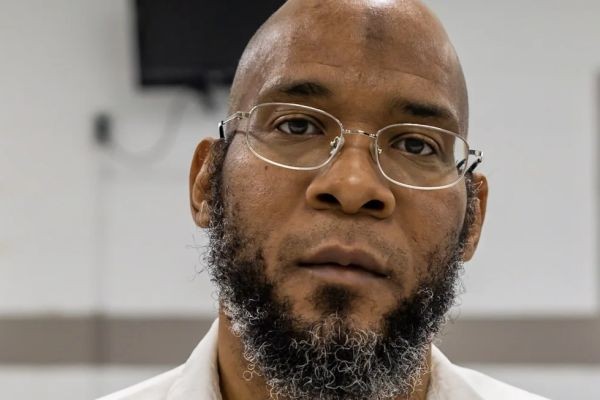The 55-year-old was put to death around 6 p.m. CT at the state prison in Bonne Terre.
Williams’ attorneys had filed a flurry of appeal efforts based on what they described as new evidence – including alleged bias in jury selection and contamination of the murder weapon prior to trial. The victim’s family had asked the inmate be spared death.
The US Supreme Court’s action came a day after Missouri’s supreme court and governor refused to grant a stay of execution.
The high court offered no explanation for its decision, which is common for cases on its emergency docket. There were no noted dissents in two of Williiams’ appeals. In a third, Justices Sonia Sotomayor, Elena Kagan and Ketanji Brown Jackson said they would have granted the request to pause the execution.
Williams was convicted in 2001 of killing Felicia Gayle, a former newspaper reporter found stabbed to death in her home in 1998.
“We hope this gives finality to a case that’s languished for decades, re-victimizing Ms. Gayle’s family for decades,” Gov. Mike Parson said in a statement read by Trevor Foley, director of the Missouri Department of Corrections. “No juror no judge has ever found Williams’ innocence claim to be credible. Two decades of judicial proceedings and more than 15 judicial hearings upheld his guilty conviction. Thus the order of execution has been carried out.”
Before the execution, one of Williams’ attorneys, Tricia Rojo Bushnell, told CNN’s Jake Tapper the state was prepared to kill an innocent man.
“They will do it even though the prosecutor doesn’t want him to be executed, the jurors who sentenced him to death don’t want him executed and the victims themselves don’t want him to be executed. We have a system that values finality over fairness, and this is the result that we will get from that.”
“It is news to all of us, and I think that it should be a shame to all of us, that we have a system that will let a man be executed in spite of all of this, really is not a system of justice,” the attorney said.
In a statement posted on X, the NAACP said “Missouri lynched another innocent Black man. Governor Parson had the responsibility to save this innocent life, and he didn’t … We will hold Governor Parson accountable. When DNA evidence proves innocence, capital punishment is not justice – it is murder.”
Recently, the top prosecutor in St. Louis County joined Williams’ attorneys in asking for the conviction to be overturned after new testimony from the 2001 trial prosecutor and recent DNA testing showed evidence contamination.
The case highlighted the issue of potentially putting an innocent person to death – an inherent risk of capital punishment. At least 200 people sentenced to death since 1973 were later exonerated, including four in Missouri, according to the Death Penalty Information Center.
Williams’ last moments
Williams’ last statement, witnessed on September 21, was “All Praise Be to Allah In Every Situation!!!” Williams was a devout Muslim, an imam for prisoners and a poet, according to his legal team.
Williams’ last meal included chicken wings and tater tots, said Karen Pojmann, spokesperson for the Missouri Department of Corrections.
He had a final visit with Imam Jalahii Kacem from around 11 a.m. to 12:30 p.m. CT.
Around 4:50 p.m., the Department of Corrections received word that all petitions had been denied by the US Supreme Court, and about an hour later, witnesses, including Williams’ son and two of his attorneys, were moved into the viewing area of the prison, Pojmann said at a news conference.
At 6 p.m., state Attorney General Andrew Bailey notified the Department of Corrections that there were no legal impediments to the execution. The lethal injection was administered at 6:01 p.m. and Williams was pronounced dead at 6:10 p.m., Pojmann said.
Around 100 demonstrators were present on the prison grounds protesting capital punishment and Williams’ execution, Pojmann said.
No one from Gayle’s family was present for Tuesday’s execution.
The decision to proceed with the execution has been met with significant backlash, as both the victim's family and the original prosecutors on the case had publicly requested that Williams' sentence be commuted to life imprisonment without parole. Their pleas were based on new evidence that emerged after the trial, which they argued cast doubt on Williams' guilt.
According to the Death Penalty Information Center, as of October 2021, there have been 1,532 executions in the United States since 1976, when the Supreme Court reinstated the death penalty. Missouri ranks fifth among states with the most executions, having carried out 90 since 1976. However, the execution of Williams marks the first in Missouri since January 2017, reflecting a nationwide trend of declining use of the death penalty.
The case of Marcellus Williams has been a contentious one, with critics arguing that the new evidence, which includes DNA found at the crime scene that did not match Williams', should have been enough to grant him a new trial. The Midwest Innocence Project, a non-profit organization dedicated to the exoneration of wrongfully convicted individuals, has been particularly vocal in their support for Williams, citing the DNA evidence as a clear indication of reasonable doubt.
However, the Missouri Supreme Court denied Williams' request for a stay of execution in August 2021, with the majority opinion stating that the new DNA evidence was not sufficient to overturn the original conviction. The court pointed to other circumstantial evidence, including some of Gayle's personal items found in Williams' possession, as proof of his guilt.
The execution of Marcellus Williams has reignited the debate over the use of the death penalty in the United States, particularly in cases where new evidence emerges after the original trial. Advocates for criminal justice reform argue that this case underscores the need for a more thorough and careful consideration of post-conviction evidence, while proponents of the death penalty maintain that the system worked as intended, delivering justice for the victim.
Regardless of one's stance on the issue, the execution of Marcellus Williams serves as a stark reminder of the high stakes involved in capital punishment cases, and the critical importance of ensuring that all available evidence is thoroughly examined and considered.
Sources:
- Death Penalty Information Center: https://deathpenaltyinfo.org/facts-and-research/recent-legislative-activity
- Midwest Innocence Project: https://themip.org/
- Missouri Supreme Court Decision: https://www.courts.mo.gov/file.jsp?id=120874
- National Registry of Exonerations: https://www.law.umich.edu/special/exoneration/Pages/about.aspx
- Bureau of Justice Statistics: https://www.bjs.gov/index.cfm?ty=tp&tid=18









